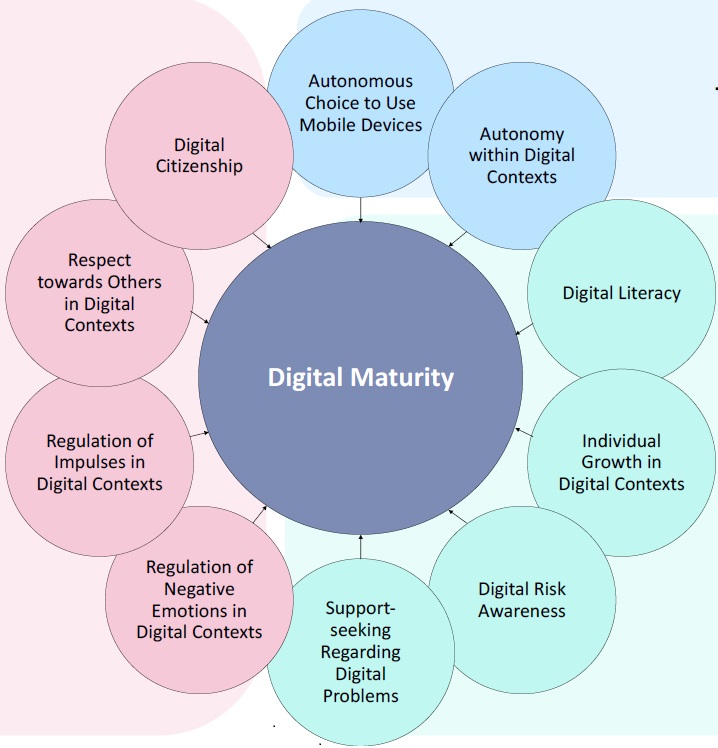Promoting Digital Maturity among various European stakeholders in general and to its youth in particular is a key strategy and policy of the EU as increased digital maturity is an essential facilitator to ensure the competitiveness of the European economy.
Digital maturity is the ability to quickly respond to or take advantage of opportunities in the market based on current tech stacks, staffing resources, and digital technology. Measuring digital maturity is first and foremost measuring the ability to generate value through digital means. Digital maturity effectively measures a level of digital technology implementation and the success utilizing these technologies.
Promoting Digital Maturity, will also consider measures to mitigate the negative societal impacts of young people’s digital technology use, including the use of mobile devices and information and communication technologies (ICTs).
A large body of research has demonstrated these negative effects (Laaber, Florack, Koch & Hubert, 2023). Therefore, DIGYMATEX is providing evidence-based tools to measure young people’s digital maturity as well as predicting and explaining benefits and risks arising from ICT-related behaviour, based on clear evidence on how digital maturity impacts behaviour associated with ICTs.
Therefore, the DIGYMATEX project will provide tools that allow to measure digital maturity well as the risks arising from ICT-related behaviour. Tools that allowed measuring both issues were lacking so far and this was a barrier to develop evidence-based policy.
The development of s valid and reliable measurement tool – Digital Maturity Inventory (DIMI) – to measure Digital Maturity will contribute to a safer and more beneficial use of digital technologies and will be able to formulate concrete recommendations and insights for relevant stakeholders.
The first results of the DIGYMATEX project confirm that digital maturity is linked to personality maturity (agreeableness, conscientiousness, negative emotionality), and the unique influence of digital maturity in predicting problematic mobile device use beyond individual differences in personality, age, and amount of mobile device use.
Following some preliminary data, we identified three distinct digital maturity groups. The High Maturity with Moderate Usage group exhibit high psychosocial well-being in terms of their interactions with digital technologies as they seem well-aware of their actions and consequences online, are respectful to individuals and society while online and have good self-control over their negative emotions and overall technology usage.
The Average Maturity with low usage group has children that have above average self-control over their digital technology usage indicating autonomous behaviour in digital context and are fairly aware about the online risks and have respect towards individuals in online communities.
The reason they lack digital citizenship and individual growth capabilities can be attributed to the fact that their overall usage of digital technologies is the least.
The Low Maturity with High Usage group clusters children with poor psychosocial maturity who are more prone to cyber-crimes, cyber bullying and online harassment owing to their impulsive technology use patterns, lack of digital risk awareness and high overall technology usage. Since children in this group have the highest overall technology usage, these children are more prone to poor well-being.
Our results will be noteworthy for parents and educators since it enables them to understand children’s behavioural attributes based on the kind of interactions they have with digital technologies.
The DIMI tool allows to measure this in order to identify gaps of digital maturity in European regions. Thus, the project outcomes directly target the priority of the European Commission of “Empowering people with a new generation of technologies“. DIGYMATEX will add to the facilitation of health and well-being for children and adolescence – creating a better life with the help of digital technology.
Therefore, the DIGYMATEX project through the DIMI tool will contribute to both improving the digital maturity of Europe in general, while simultaneously ensuring a safer and more beneficial use of digital technologies. Using the DIMI tool will be able to formulate concrete recommendations and insights for all relevant stakeholders, including policy makers as the DIMI provides reliable and valid measures that can form the base of additional policy measures either to improve digital maturity in certain regions (if gaps are found) or for mitigating the negative societal impacts of young people’s digital technology use.
—-
The author is the Dissemination and Communication Manager of DIGYMATEX and also a member of the Project Executive.


